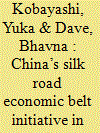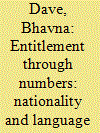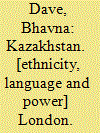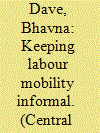| Srl | Item |
| 1 |
ID:
160470


|
|
|
|
|
| Summary/Abstract |
The Silk Road Economic Belt (SREB) initiative, launched by Xi Jinping in 2013 as the Central Asian component of the Eurasian Belt and Road Initiative (BRI), is presented as a trade and infrastructural developmental initiative that benefits all to deliver stability. It consolidates Beijing’s existing economic investments and security-building measures, while launching new projects to link the regions of Central Asia and South Asia more closely with China and extend the arc of security westward and develop these as a transport corridor linking China to Europe. This article examines the interaction between China’s infrastructural investments and security dynamics in the Central Asian region, exploring why the BRI/SREB, presented by China as primarily as a developmental vision, is fraught with wide-ranging security implications. We examine the reception of China’s BRI/SREB in Central Asia focusing on the following three dimensions: (1) the lure of Chinese investments which makes SREB particularly attractive for Central Asian countries; (2) the securitization thrust of the Silk Road initiative which consolidates the power of the Central Asian regimes but also grants considerable role to China in managing security arrangements; (3) elite maneuvering between the lure of Chinese investments and appeasing popular anxieties about China’s growing influence. It points to the overall positive reception in the region to the aid and investment offered by China, while noting the variance in their responses based on the implications of SREB for their sovereignty and security and also concerns on whether the promised benefits of connectivity and development (a “win-win” scenario) will materialize. The article concludes by outlining the implications of China’s rising economic and security engagement in Central Asia and the close Sino-Russian partnership for European financial and security interests and highlights the areas of cooperation and complementarity between China and EU in the region.
|
|
|
|
|
|
|
|
|
|
|
|
|
|
|
|
| 2 |
ID:
058511


|
|
|
| 3 |
ID:
079429


|
|
|
|
|
| Publication |
London, Routledge, 2007.
|
| Description |
xiv, 242p.hbk
|
| Series |
Central Asian Studies Series
|
| Standard Number |
9780415363716
|
|
|
|
|
|
|
|
|
|
|
|
Copies: C:1/I:0,R:0,Q:0
Circulation
| Accession# | Call# | Current Location | Status | Policy | Location |
| 052802 | 958.45/DAV 052802 | Main | On Shelf | General | |
|
|
|
|
| 4 |
ID:
134372


|
|
|
|
|
| Summary/Abstract |
Kazakhstan's legal–regulatory framework provides for a small number of quotas for highly skilled foreign workers but has no provisions for legal employment of semi-skilled or low-skilled migrants from the Central Asian states, who enter under the Commonwealth of Independent States (CIS) visa-free regime and work informally in construction, household and service sectors. The lack of acknowledgement of the scale of informal labour migration has denoted an act of strategic neglect on the part of the state, allowing it to render migrant labour illegal, disposable, and keep migrants legally and statistically invisible. Unable to obtain a legal status, migrants nominally comply with the existing legal framework as they also circumvent and subvert it. The article details the entrenched informal regime of labour migration and explains why recent efforts to ‘legalize’ labour through the introduction of a labour patent (licence), as is the case in Russia, are unlikely to bring in significant reforms.
|
|
|
|
|
|
|
|
|
|
|
|
|
|
|
|